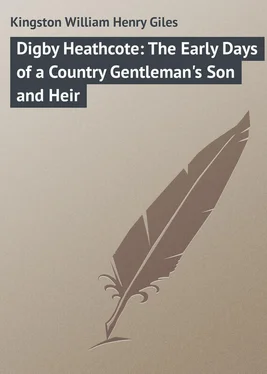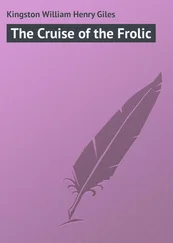William Kingston - Digby Heathcote - The Early Days of a Country Gentleman's Son and Heir
Здесь есть возможность читать онлайн «William Kingston - Digby Heathcote - The Early Days of a Country Gentleman's Son and Heir» — ознакомительный отрывок электронной книги совершенно бесплатно, а после прочтения отрывка купить полную версию. В некоторых случаях можно слушать аудио, скачать через торрент в формате fb2 и присутствует краткое содержание. Издательство: Иностранный паблик, Жанр: foreign_prose, foreign_children, на английском языке. Описание произведения, (предисловие) а так же отзывы посетителей доступны на портале библиотеки ЛибКат.
- Название:Digby Heathcote: The Early Days of a Country Gentleman's Son and Heir
- Автор:
- Издательство:Иностранный паблик
- Жанр:
- Год:неизвестен
- ISBN:нет данных
- Рейтинг книги:5 / 5. Голосов: 1
-
Избранное:Добавить в избранное
- Отзывы:
-
Ваша оценка:
- 100
- 1
- 2
- 3
- 4
- 5
Digby Heathcote: The Early Days of a Country Gentleman's Son and Heir: краткое содержание, описание и аннотация
Предлагаем к чтению аннотацию, описание, краткое содержание или предисловие (зависит от того, что написал сам автор книги «Digby Heathcote: The Early Days of a Country Gentleman's Son and Heir»). Если вы не нашли необходимую информацию о книге — напишите в комментариях, мы постараемся отыскать её.
Digby Heathcote: The Early Days of a Country Gentleman's Son and Heir — читать онлайн ознакомительный отрывок
Ниже представлен текст книги, разбитый по страницам. Система сохранения места последней прочитанной страницы, позволяет с удобством читать онлайн бесплатно книгу «Digby Heathcote: The Early Days of a Country Gentleman's Son and Heir», без необходимости каждый раз заново искать на чём Вы остановились. Поставьте закладку, и сможете в любой момент перейти на страницу, на которой закончили чтение.
Интервал:
Закладка:
“I’ll tell you what it is, young gentlemen,” said Toby, who had been listening in silence to Digby’s and the other boys’ thoughtless remarks, “smuggling is a very bad business, let me tell you. I’ve seen something of it, and I know what it is. I’ve seen money made by it, I’ll allow, just as I’ve seen money made by other evil practices; but I’ve seen very many fine fellows brought to a bad end by it, and have never known any to prosper long at it. Laws were made for the good of all, and no man has a right to break them for his own advantage or pleasure. Though I’m only a poor boatman I’ve found that out, and it’s my duty to make others understand the truth, as well as I can.”
The boys confessed that they had never before seen the matter in that light. They had thought smugglers, and pirates, and bandits, and highwaymen, and outlaws of all descriptions very fine fellows; and it had never occurred to them that they should be looked upon as base scoundrels, who deserved to be hung, or severely punished in some other way.
“Now let us have out the lines,” exclaimed Power, who was eager to begin fishing. Two of the party paddled the boat on, relieving each other, at the rate of about two miles an hour.
Toby produced four long, thin lines, wound up on wooden reels. The lines were considerably slighter than log-lines. Five hooks were fastened to each, about a yard apart.
“But where is the bait?” asked Digby. “You cannot catch fish without bait.”
“Oh, mackerel are in no ways particular,” answered Toby; “a bit of tin or white rag will attract them; but see, I have some hooks with some capital bait. It is called a white cock’s hackle. The feathers are fastened on to the butt, and project an inch or more beyond the bend, so as to cover the barb. This is certain to catch any fish which see it.”
The lines were thrown overboard, one on each side, and one over each quarter. Toby assisted Digby to manage his.
Digby was quite delighted when he felt a sharp tug at the end of his line.
“Haul in, haul in; you’ve got him,” said Toby.
Digby hauled away, and soon he saw a fish skimming and jumping along on the smooth surface of the blue water, leaving a thin wake behind him, while his bright scales glistened in the sun. Digby shouted with glee, – “I’ve the first, I’ve the first. Huzza!”
He almost tumbled overboard in his eagerness to catch hold of the fine mackerel which came with what he called a hop, skip, and a jump alongside. He lifted the fish in. The poor mackerel, with his dark back and white belly, did not look nearly so bright out of the water as he had done in it. Digby thought it a very elegant-looking fish, and very unlike any he had ever before caught with John Pratt.
“Now we shall catch a plenty,” said Toby, as, to Digby’s dismay, he took the fish, and, cutting it up into strips, baited each of the hooks with it. “These mackerel like nothing better than their own kind.”
Two or three dozen mackerel were quickly caught, of which Digby hauled up several.
“But have we no chance of catching any carp, or tench, or perch?” he asked, seriously. “I should have thought that there must be plenty about here.”
His companions laughed heartily.
“What is the taste of the water alongside?” asked Marshall.
“Salt,” said Digby, tasting it.
“Do you think freshwater fish will live in salt-water?” observed his friend.
“Oh, you fine sportsman! You laugh at us for not knowing so much about dogs, and horses, and shooting, and racing, and hunting as you pretend to do, and yet you are ignorant of far more important, and just as interesting matters.”
“Still, young gentlemen, I’m thinking that every man shines most in his own element, as the mackerel would say, if they could speak, and would rather be left there,” observed Toby, who was a great philosopher in many respects, although no man could be much more prejudiced with regard to his own calling of a sailor than he was. Such is often the ease. When judging of the opinion of others, we should always try to discover whether we are not prejudiced too much in favour of our own.
The boys had a capital evening’s sport, and Digby learned much more about conger-eels, and whiting, and bass, and mullet, and turbot, and plaice, and John Dories, and brill, and other salt-water fish, than he had ever known before. He was daily discovering, by practical experience, that there are many things in creation “of which he had never before dreamed in his philosophy.” In other words, he began to suspect, that though he was a very fine fellow, daring to do anything, and ready to fight any boy of his age, he was in reality a remarkably ignorant young gentleman. This, to a lad of Digby’s disposition, was a very important discovery. He was, I hope, on the high road to improvement. There is a saying, that “Where ignorance is bliss, it is folly to be wise;” but depend on it, the moment the ignorance is suspected, it is much greater folly not to set strenuously to work to correct it.
When the lads got home, they recounted with great glee their adventures, and offered, with much satisfaction, their baskets of fish to Mrs Nugent. They were served up fresh for breakfast and dinner the next day, and for two or three days afterwards, cut open and salted.
Digby heard Mr Nugent speaking of the wonders of the deep.
“What, uncle, are there any things besides fish in the sea?” he asked with, what the other boys thought, an almost incredible amount of simplicity.
One of the few recreations Mr Nugent allowed himself, was a fishing expedition on board a trawler. Not that he cared much for the fish which the trawl caught, but his delight was to examine the numberless specimens of animal marine life which came up at the same time. Digby heard his uncle and Marshall talking about Noctilucae, and Medusae, and Cydippi Actiniae, and Asterias, and Echini, and Terebellae, and Nereides, and Cirripedes, and Solens, and Gastropods, and numberless other creatures with hard names, which he thought that he could never recollect, and about which he was persuaded he could not understand.
“And are all these animals found in the sea near here?” he asked.
“Yes, and thousands more,” answered his uncle; “it would take a lifetime to catch and note the habits of those found on this coast alone. Each person can only hope to add a little to the stock of knowledge which others have obtained, and to ascertain what has been discovered by others. Still, the pursuit of that knowledge is so delightful, as is, indeed, the study of all God’s works, that those occupied in it find themselves amply repaid for all the physical and mental exertion they have to take to attain it.”
“Are the things you speak of like horses, and dogs, and cats, or more like fish?” asked Digby, seriously. “I should think with such curious names they must be very curious looking things.”
Marshall and Power laughed heartily, and even his uncle could not help smiling as he replied:
“Curious and wonderful, indeed, they are, but they are not fish in appearance, and still less like terrestrial quadrupeds. Some have their heads at the end of their feet, and their eyes at the extremities of their arms. Some walk on their heads, and others have their arms growing from the top of their heads. Some, too, can turn themselves inside out, and others of their own accord, break themselves to pieces, and then, what is more wonderful still, like one of the tricks to be seen at a pantomime, the bits send forth arms, and legs, and heads, and tails, and become perfect animals again.”
Digby listened with mute astonishment. He knew that his uncle would not tell him an untruth, and yet he fancied that, somehow or other, he must be laughing at him. The account he had heard, however, made him look forward eagerly to the promised trawling expedition.
Читать дальшеИнтервал:
Закладка:
Похожие книги на «Digby Heathcote: The Early Days of a Country Gentleman's Son and Heir»
Представляем Вашему вниманию похожие книги на «Digby Heathcote: The Early Days of a Country Gentleman's Son and Heir» списком для выбора. Мы отобрали схожую по названию и смыслу литературу в надежде предоставить читателям больше вариантов отыскать новые, интересные, ещё непрочитанные произведения.
Обсуждение, отзывы о книге «Digby Heathcote: The Early Days of a Country Gentleman's Son and Heir» и просто собственные мнения читателей. Оставьте ваши комментарии, напишите, что Вы думаете о произведении, его смысле или главных героях. Укажите что конкретно понравилось, а что нет, и почему Вы так считаете.












